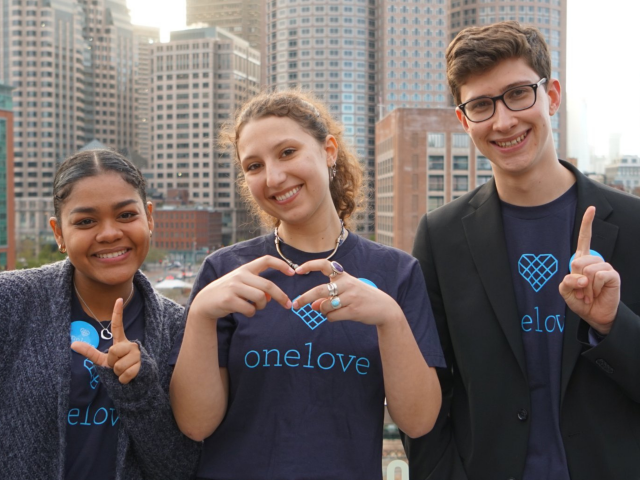If you see a friend that is struggling or in pain, your first instinct is likely to help them in any way you can. Especially, if you think (or you know) that person is in an unhealthy relationship. On average, it takes about 7 attempts before a person fully leaves an abusive relationship, and it is never as easy as “just leaving.” However, unhealthy relationships often affect more than just the people involved. So, what happens when you start to feel emotionally exhausted?
Compassion fatigue is a type of stress that involves “physical and emotional depletion” as a result of “caring for someone in significant emotional or physical distress.” People experiencing compassion fatigue usually display a lack of empathy or indifference toward the person they’re caring for. Sound familiar? Other symptoms include headaches, digestive problems, feeling overwhelmed and irritability.
It’s normal to feel emotionally overburdened when you take on a “helping role.” And in most cases, a simple way to alleviate this is by taking a step back and making sure you’re taking care of yourself first. Trying to help a friend through a tough situation not only impacts you because you care about your friend and want to help lessen their struggle, but also because not knowing how to help to take away their pain can feel overwhelming. That said, if you continue to feel anxious, exhausted and unusually detached from the people around you, then you may be experiencing compassion fatigue.
5 Signs You Are Experiencing Compassion Fatigue (And How To Move Past It):
1. APATHY: You Literally Can’t Anymore
It can be hard to hear a friend talk about a problem and (from your perspective) feel powerless to help them. If you find yourself feeling apathetic toward a person you know is in an unhealthy relationship, then this may be the first sign of fatigue. Stepping away from the situation (at least for a little) and asking for help from a trusted friend or counselor may be the best thing for you at this time. Remember, your friend is likely picking up on your frustration, which serves no one and may compound any feelings of isolation they are experiencing.
2. ANGER: You’re Angry at the Person Experiencing Abuse
This one can be extra tough because chances are you don’t want to be angry at the person experiencing abuse – REMEMBER it is NOT their fault – but if you’re feeling any sort of animosity toward your friend, this can cause a lot of internal conflicts. Sometimes, it’s easier to get angry at your friend instead of the root of the problem; their partner who is doing unhealthy or abusive things to them. Just keep in mind that they are going through a lot with the relationship. It’s ok to set personal boundaries. And if your anger persists, there’s no need to suffer in silence. Speak with a counselor to help you work through your feelings.
3. ISOLATION: You’re Avoiding People
If you find that you are not just avoiding the person in an unhealthy relationship, but also everyone in your life, then you may be experiencing compassion fatigue. And we don’t mean wanting to relax and watch Netflix alone on a Saturday night. What makes compassion fatigue different is the feeling of being overwhelmed to the point where you have a hard time connecting with others or lack the desire to do anything beyond binge watching Gilmore Girls.
4. NEGATIVITY: You’ve Become a Pessimist
It’s hard to try to help a person and feel like nothing you do is making the situation better. Compassion fatigue can amplify this feeling, making it difficult to be optimistic about anything. If you’re a person who is normally optimistic about life, yet find yourself having a negative comeback for everything– pay attention. A significant negative change in your normal behavior can be a sign of compassion fatigue.
5. FATIGUE: You’re Tired All. The. Time.
Personally, I don’t remember a time in my life when I wasn’t tired. But when you’re experiencing compassion fatigue, the exhaustion is overwhelming. It’s why you isolate yourself, it’s why you’ve stopped working out, and it’s why you literally can’t anymore.
So, if you think you’re experiencing compassion fatigue, what can you do?
Be Honest With Yourself And Others
Often times compassion fatigue is a result of either forgetting to check-in with yourself or knowing how you’re feeling, but not being open or honest about it. Sometimes it just feels easier to put other people’s needs before your own. However, we can’t actually be there for others if we aren’t there for ourselves first. Many people that experience compassion fatigue also feel shame towards themselves for not being able to support their friend the way they would like too. When you begin to feel overwhelmed and overburdened by helplessness, the best thing to do is to reach out for support. Dealing with compassion fatigue is hard and something you don’t have to go through alone. Your campus health center or school counselors are great resources. So are trusted friends, family members, and mentors.
For tips on how to compassionately help a friend through an unhealthy relationship, check out “How To Help A Friend Who May Be In An Abusive Relationship.”
If you or a friend is dealing with relationship abuse, check out our real-time resources page to find help from trusted professionals. And, if you or a friend are experiencing compassion fatigue talk or text a mental health professional in your area using Text-a-Tip.
Browse by Category


How to Have Healthy Holiday Conversations with Family (and Prep Your Partner)
The holidays are a time for family, good food, and—let's be real—sometimes intense conversations. Whether it's politics, lifestyle choices, or…
3.2 Million Strong: How One Love is Saving Lives Through Education
Please share this blog with your network across social media,…
Finding Strength in Our Stories: Domestic Violence Awareness Month
⚠️ Trigger Warning: This blog includes content and language related…
Understanding Domestic Violence Awareness Month (DVAM)
October is almost here, and that means it’s time to…
4 Students Share How They Helped a Friend in an Unhealthy Relationship
Watching a friend struggle in an unhealthy or abusive relationship…

















